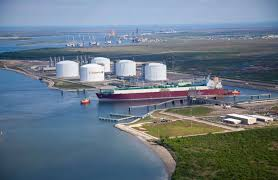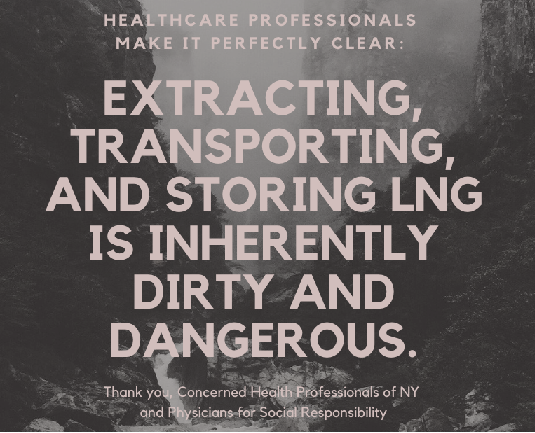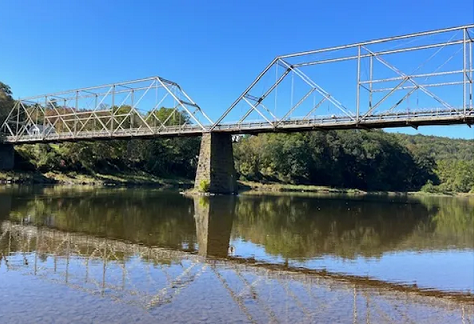
Public Opposition to Gibbstown LNG Export on Delaware River Explodes
December 5, 2020
Josh Fox Says: Help DCS Fight for You
December 6, 2020DRBC should pay attention to these letters!
Concerned Health Professionals of New York, and other organizations, have written these important letters to the DRBC detailing the risks of the Gibbstown LNG Export Terminal and opposing a permit for this project. See the Week of Action Toolkit for ways that you can join in opposition to this dangerous project.
December 4, 2020
Commissioners
Executive Director Steve Tambini
Delaware River Basin Commission
Dear Commissioners and Director Tambini,
We write to request that you not approve the Gibbstown LNG proposal under consideration at the December 9th meeting of the DRBC.
Our research on the harms and risks of fracking and gas infrastructure documents that natural gas and LNG are detrimental to local, regional, and global health. Information we have compiled, and material which will be included in the soon to be released 7th edition of the Compendium, only further verifies that position. In September 2020, we, together with other medical professionals, scientists and first responders, sent a letter to you documenting the harms and risks associated with LNG production and its transport. That letter is attached here again for your reference.
The Compendium of Scientific, Medical, and Media Findings Demonstrating Risks and Harms of Fracking from which the attached letter is drawn, compiles the significant and rapidly accumulating body of evidence demonstrating that drilling and fracking activities, including gas infrastructure like the proposed Gibbstown LNG terminal, pose serious risks of water contamination and harm to public health. To protect the Delaware River Watershed, we urge you to deny the proposal for the Gibbstown LNG terminal. We hope that this information is helpful as you address this issue, and we would be glad to discuss it further and answer any questions.
Sincerely,
Concerned Health Professionals of New York
September 3, 2020
Delaware River Basin Commission
Governor Andrew M. Cuomo
The Honorable Tom Wolf, Office of the Governor of Pennsylvania
Governor Phillip D. Murphy
Office of the Governor c/o John Carney, Chair – Delaware River Basin Commission
Dear Governors,
As health experts, scientists, and first responders, we write to urge that you deny the proposed liquefied natural gas (LNG) and natural gas liquids (NGL) export facility in Gibbstown, New Jersey, part of the Delaware River Basin. The facility is proposed as a hub for storage and transport of natural gas liquids, brought by freight rail cars and trucks, to then be transported down the Delaware River by large shipping vessels. We ask that you deny the project given that the transport and storage of LNG is extremely hazardous and the activities associated with the extraction of so-called “natural gas” are highly dangerous, posing significant threats to the people, communities, and environment in the Delaware River Basin.
Extracting, transporting, and storing LNG is inherently dirty and dangerous. The LNG that would be transported is fracked natural gas that has been super-cooled to a bubbling, cold liquid (-259°F). Prior to super-cooling, the gas must be stripped of volatile impurities like benzene, making the liquefying process a potent source of toxic air pollutants (Fracking Science Compendium footnotes 1226-1242).
LNG is explosive. It explodes when spilled into water. If it spills on the ground, LNG can turn into rapidly expanding clouds of vapor that can flash-freeze human flesh and asphyxiate by displacing oxygen. If LNG vapors are ignited at their source, they can become flaming pool fires that burn hotter than other fuels and cannot be extinguished. Such fires can reach temperatures hot enough to cause second-degree burns on people and animals up to a mile away. For these reasons, LNG facilities have been identified as potential terrorist targets.
These risks were made acutely and tragically clear in an incident in China this June when a truck carrying LNG exploded on a highway. Nineteen people died and more than 170 more were injured. Various other LNG facilities, including facilities in the United States, have experienced major explosions and other safety problems.
A 2008 Congressional Research Service report concluded that LNG infrastructure is “inherently dangerous” with serious risks including pool fires with intense heat, which can occur when LNG spills near an ignition source; flammable vapor clouds that can drift until reaching an ignition source; and a rapid phase transition that can generate a flameless explosion. More recent studies confirm these inherent dangers and risk to public safety, which are particularly problematic on inland waterways.
We are deeply concerned that no full quantitative risk assessment has been conducted to identify the likelihood and frequency of transportation-related accidents and consequences. The number and scale of freight rail and truck trips make the risks to communities throughout the region significant. A single incident like the LNG truck explosion in China could spell disaster for people and the environment. Many local first responders do not have the training or equipment to deal with LNG accidents, and work-related training opportunities are infrequent or unavailable.
If built and operated as proposed, the Gibbstown facility would be the first LNG facility to rely extensively on rail and trucks for transportation. Never before has LNG been transported overland in such volumes and for such distances.
Any incident either on land or with shipping vessels in the Delaware River could be catastrophic, affecting the environment and the quality of water on which more than 15 million people rely. Introducing an intensive industrial process, based on largely untested and unstudied systems, poses a significant risk. These risks are on top of the known impacts that would come from building the LNG export terminal, which would entail significant dredging of the river, thousands of truck trips, and significant rail and shipping activity.
Additionally, we believe the climate change implications of the proposed LNG facility are contradictory to the mission of the Delaware River Basin Commission (DRBC) and the climate commitments of Delaware, New Jersey, Pennsylvania, and New York. LNG derives from fracked gas, which is already very damaging to the climate given significant methane leaks, and makes it even worse for the climate. The super-cooling process and transportation requires a substantial amount of energy and leads to even greater emissions during the required boiling off, evaporative cooling process. Overall, the export of LNG is an extremely high Green House Gas (GHG) emitting process.
The DRBC Adjudicatory Hearing on the project, completed May 20, 2020, did not address the issues we have raised in this letter. Most importantly, it did not address the public health and safety issues or broader concerns about accidents and explosions. While the Adjudicatory Hearing reviewed implications for critical species, the review suffers from not considering impacts related to these and other cumulative impacts and risks.
Please address the significant risks and known impacts of the proposed LNG/NGL export facility in Gibbstown, New Jersey. To protect public health, community safety, the environment, and the Delaware River, deny this dangerous and unnecessary project.
Sincerely,
Physicians for Social Responsibility
Concerned Health Professionals of New York
Physicians for Social Responsibility – New York
Physicians for Social Responsibility — Pennsylvania




